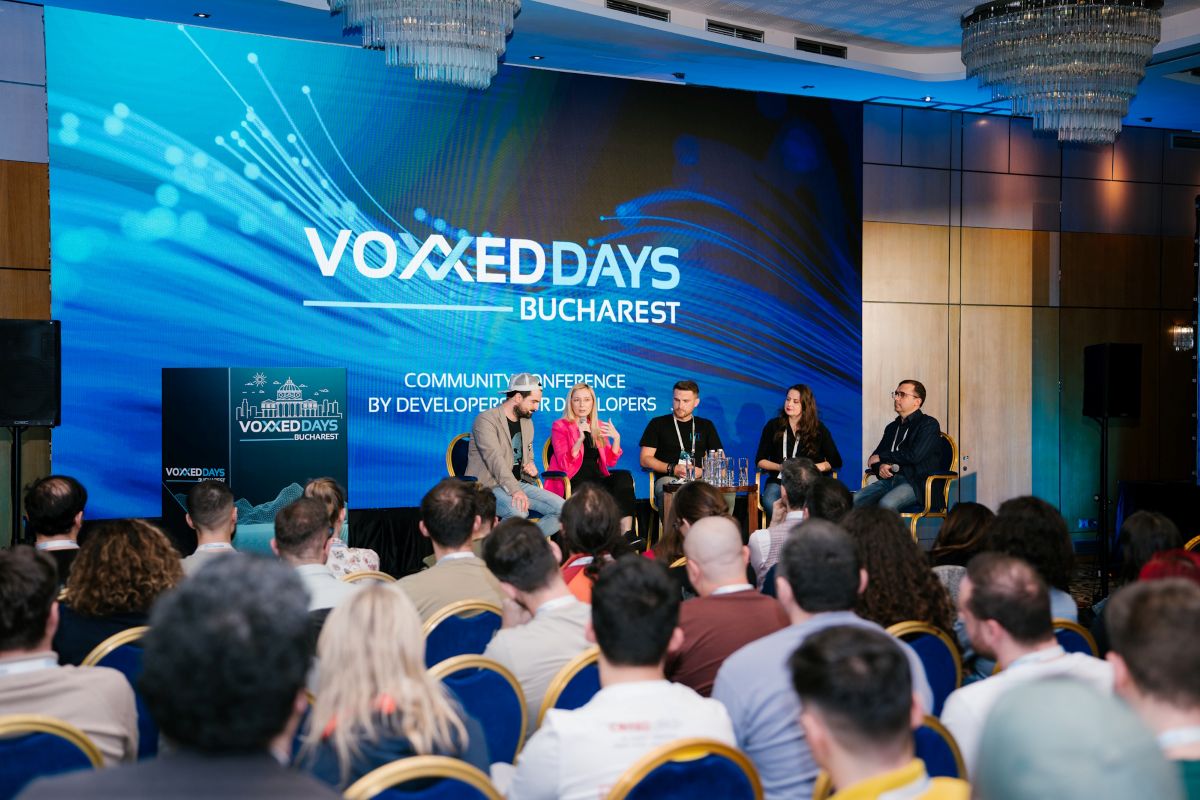Voxxed Days Bucharest 2025, Conference Day. AI, Purpose, and Building the Future of Tech in Romania
Voxxed Days Bucharest 2025 kicked off with a focus on AI, purpose, and building the future of tech in Romania. The conference day featured discussions on how artificial intelligence is shaping the industry and the importance of fostering a sense of purpose in tech innovation. Attendees explored ways to drive technological advancements in Romania and pave the way for a thriving tech ecosystem in the country. The event provided a platform for industry experts and enthusiasts to exchange ideas and insights on the future of technology.

Voxxed Days Bucharest 2025 Conference Overview
I'm grateful we managed to bring together 300 developers and tech team leaders again this year, in a conference dedicated to a passionate developer community. It was a significantly bigger effort than in previous years, given the challenging market conditions, but we remain optimistic that our initiative helped developers reconnect with the power of community.
Day 1: 26th March
Dedicated fully to intensive technical sessions, Day 1 of the event was valuable for delving deep into real-world case studies and applied examples, offering attendees hands-on experience and advanced knowledge. More and more developers are beginning to understand the value of investing in their most important asset: their own education. We're fully committed to supporting them in this journey—from an engineering mindset to a true product mindset.
Day 2: 27th March
Day 2 of Voxxed Days Bucharest 2025 brought essential conversations to the stage—discussions on access to capital, talent retention, the integration of AI, ways in which new generations can help shape a resilient and globally competitive tech ecosystem in Romania, and the role of communities.
The first panel tackled the current state and future of Romania’s tech industry, underlining its strategic role in the national economy, contributing 8% to GDP. Despite the abrupt removal of tax incentives, Romania remains a valuable tech hub due to its high density of skilled engineers and strong international reputation. Speakers emphasized the urgent need to shift from an execution-based model to product innovation, supported by accelerators, educational programs, and increasing access to early-stage capital.
Programs like Microsoft’s talent pipelines and Project Europe’s €10M fund for young founders were highlighted as key drivers for nurturing the next generation. The conversation also touched on the importance of equity awareness, purpose-driven retention strategies for senior talent, and the opportunity for Romania to build core AI-first companies.
Panel Discussions
The panelists addressed the importance of investing in the new generation. Microsoft Romania runs dedicated programs for students and master's graduates, offering more than just mentorship. TechAngels Romania introduced Project Europe—a €10 million early-stage fund launched in March 2025 to support young European entrepreneurs.
Young people today have incredible opportunities. But the world is constantly shifting—they need to understand it and navigate it wisely. As companies become more goal-oriented, this will naturally lead to higher quality among experts. We need a balance of risk— not just on the side of companies. Large paychecks should no longer be taken for granted. Young professionals today care more about impact than billable hours.
Founders are starting to understand equity. People are getting educated. My advice—both for juniors and seniors—is to ask about equity when you’re hired. Salaries are no longer the only motivator. Last but not least, the way a company defines its ambitions will determine whether people stay or leave.
Microsoft responded to critiques about the societal impact of AI, noting that they’ve been accused of "making people stupid" by developing tools that weaken human thinking. Addressing the absence of Romania among the six EU-supported AI factory locations, Marius Istrate emphasized that not having an AI factory doesn’t matter. Everything is still possible, both at the private and government levels. There’s never been a better time to build an AI company in Romania.

